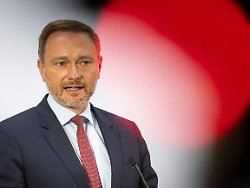Friday 29 October 2021
Climate-damaging funding
Lindner does not want to touch the commuter flat rate
The explorations for a traffic light coalition are apparently going surprisingly smoothly. It will be more difficult for the SPD, Greens and FDP on the detailed questions of the coalition agreement. While the Liberals drum up for subsidy cuts in the election campaign, they want to keep the commuter allowance.
Ineffective and climate-damaging subsidies are to be checked, the traffic light coalition negotiators are basically in agreement on this. But it gets difficult with the details. While the Greens are generally promoting a reduction in subsidies that are harmful to the climate and have propagated a limit on the commuter allowance during the election campaign, FDP chairman Christian Lindner is putting a stop sign there.
One will examine subsidies, said Lindner of the “Rheinische Post”. “However, the reduction in subsidies must not result in a tax increase for the working middle class, as would be the case with the commuter allowance.” The commuter allowance, i.e. the tax deductibility of travel costs for the way to work, is considered harmful to the climate because it also favors the use of the car.
The Green politician Sven-Christian Kindler, co-negotiator of the Finances and Budget working group, told the German Press Agency in general: “It is not smart, in the middle of the climate crisis, to fuel it with large double-digit billions in taxpayers’ money.” “Climate-damaging subsidies make the transformation of the economy expensive and inefficient, distort the market and burden the budget. In addition, they shift climate costs onto society and are unjust. Climate-damaging subsidies contradict the logic of a socio-ecological market economy.”
Lindner sees a need for action in the case of hybrid funding
According to a study by the Federal Environment Agency, environmentally harmful subsidies have increased in recent years despite greater climate protection efforts. The dismantling of tax breaks for passenger cars and agricultural diesel, for the private use of fossil-fueled company cars and for agricultural vehicles as well as the commuter allowance would bring the public sector additional income in the double-digit billion range.
Lindner questioned the funding for hybrid cars with combustion engines and separately chargeable electric motors: “For example, we are spending one billion euros in subsidies for plug-in vehicles that have no reliable ecological benefit,” he said. And with a view to planned expenditure: “In any case, projects should be prioritized. Not everything happens immediately.”
The coalition negotiators of the SPD, Greens and FDP are going into the third day of their detailed talks in 22 working groups on individual policy areas this Friday. The groups should work out their positions by November 10th. The new Federal Chancellor is to be elected in the week from December 6th. Olaf Scholz, previously SPD Vice Chancellor and Minister of Finance, will then succeed Chancellor Angela Merkel, who, like her ministers, will remain in office for as long as she is in charge. “The schedule is ambitious, but a future government must be too,” said Lindner. “St. Nicholas Week is attainable. We want to avoid night meetings with tired participants.”
Lindner is aiming for the office of finance minister, but Greens boss Robert Habeck is also being traded as a candidate. According to a survey, Lindner has the edge among the citizens. In a representative online survey by the Civey Institute, the “Welt”, 54 percent of the 5086 respondents are in favor of Lindner as finance minister and 27 percent in favor of Habeck.
